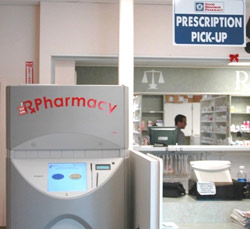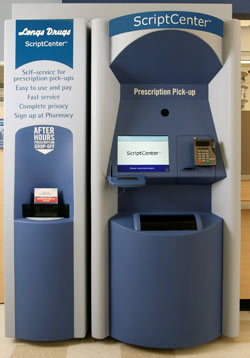Article
Controversy surrounds drug-dispensing kiosks
Automated devices that dispense pre-packaged prescription drug refills could change the way people interact with their pharmacy, and save time in the process. But some experts are worried about possible repercussions of taking the pharmacist out of the drug-buying process.
October 23, 2005 by James Bickers — Editor, Networld Alliance
Depending on the time of day or the day of week, a visit to the pharmacy might be quick and painless, or it might be the height of frustration. Lines can become oppressive during peak hours, and most pharmacy layouts are not optimized for a heavy flow of people. All of this is magnified when, for instance, that pharmacy is tucked in the corner of a high-traffic store like a large grocer or department store.
From this view, it makes sense to take the most basic pharmacy chores and turn them over to a self-service device. If a skilled pharmacist no longer had to spend a chunk of his day handing out high-dose Ibuprofen and other relatively common refills, he would have more time to devote to the customers who need to ask tough questions or get advice on drug interaction.
 This story and all the great free content on KioskMarketplace is supported by: St. Clair Interactive Communications, Inc. St. Clair's "Smart Employee" self service software delivers. Job availability, benefits enrollment and administration, training schedules and enrollment, announcements, events, etc.  |
But the pharmacy kiosk has generated much controversy in its short lifespan. Pharmacists worry that the machines threaten consumer safety, and given the current shortage of trained pharmacists, they also see them as a threat to their employment.
Should pharmacists - and consumers - be alarmed about these kiosks?
"Alarmed might be too strong a word, but pharmacists feel that a certain amount of caution is necessary because of the high probability that patients may not take the time to see their pharmacist about refills, even if they may be having side effects, or the medicine isn't working," said Judy Chi, editor-in-chief of drug topics for Advanstar Medical Economics.
What the machines do - and what they don't
Two companies are making waves with their drug-dispensing kiosks, Del Mar, Calif.-based Asteres Inc. and San Marcos-based Distributed Delivery Networks (DDN). In both cases, the machines are analogous to vending machines, albeit with a much more precious cargo than mere candy bars or soda. The kiosks do not actually fill prescriptions but dispense pre-packaged refills, once the customer swipes a credit card for identification and payment.
ScriptCenter, the Asteres offering, is currently installed in four Longs Drug Stores in California. According to company founder Linda Pinney, the devices actually encourage customers to talk to their pharmacist, something that is becoming more and more crucial as consumers flirt with the notion of buying their drugs online.
 |
| DDN's drug-dispensing kiosk, located in a K-Mart pharmacy |
"If (the consumer wishes) to speak with their pharmacist, they simply walk up to the counter, but it's their choice," she said. "The consumer can decide what they want and all options are available to them at the pharmacy. This is important at a time when many consumers are choosing mail order Â… mail order keeps consumers out of the pharmacy and does not promote a pharmacy/patient relationship."
William Holmes, chief executive officer for DDN, said that his company's machines are no threat to the pharmacy/patient relationship, given the fact that they're located right next to the pharmacy window. And the time saved for the pharmacist should allow him to spend more time talking with customers who really need help.
"We have done nothing in any way to encourage people to spend less time face-to-face," he said. "The fact is, if you have 25 people standing line, half of them are getting refills and don't need consultations - but they're taking up just as much time as if they do."
To some, these kiosks beg the question: What was wrong with the old way? Was it really that much trouble to get prescriptions across the counter?
"There's nothing wrong with the old way if you have ample, low-cost labor and you're not concerned about the errors that are made at the point of sale," Holmes said. "But as you know, we have a shortage of pharmacists, and costs are going up, and complexity is increasing. So pharmacists should be doing things like counseling patients, rather than mechanical things."
Interestingly, DDN and Asteres are not only fighting convention, they're fighting one another. Asteres filed a lawsuit in August 2004 again DDN, claiming "misappropriation of trade secrets." Holmes told The Wall Street Journal, "We are aggressively defending ourselves against this litigation." Both Holmes and Pinney are former employees of Pyxis, makers of an in-hospital drug dispensing and management system used by nurses.
Pharmacists, too, have taken the issue to the courts. In April, a group of independent California pharmacists filed suit against the state's Board of Pharmacy, claiming it didn't sufficiently assess the devices before waiving rules requiring a pharmacist's presence whenever drugs are dispensed.
Security concerns
|
If someone breaks into a candy machine, some money is lost. If a supply of drugs were to become compromised, lives could be lost. Clearly, there is much more at stake with these kiosks than with comparable product-dispensing technology.
"Obviously, the machine has to flawlessly deliver the right medication to the right patient with adequate security to prevent the theft of the drugs or disclosure of patient information," Chi said. She also expressed the concern that such a device removes a final opportunity for a trained eye to catch errors before handing the product over to consumer.
 |
| Asteres' ScriptCenter kiosk |
For physical security, Pinney said her company's machines weigh over 1,400 pounds and are anchored in cement. The machines also are equipped with a camera that records every transaction.
As for the safety of consumer data, Holmes said the DDN machine stores no information whatsoever. "It's a peripheral device to the pharmacy management system," he said. "It's only attached to the point of allowing the machine to get the name and PIN for the patient and compare it to the database to make sure you're the right person for the package."
Ultimately, Holmes sees his device as a tool to increase safety and security, not decrease it - he points to a staggering 44,000 documented deaths in 2004 due to errors related to medications.
"This technology can prevent the mismatch of a patient with a prescription,' he said.












